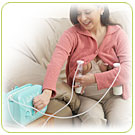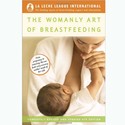 We posted information back in March about the new Health Care Legislation. While there was much to be desired about the implementation of the new law, the one thing that it did do was to offer protection for breastfeeding moms at work. And just last week, the Department of Labor issued a fact sheet explaining exactly what this means. While many other blogs have already posted information about this which can be seen here and here (amongst others), we thought it was worthwhile to bring it up again and make sure that all of your pumping, working moms know that you are protected.
We posted information back in March about the new Health Care Legislation. While there was much to be desired about the implementation of the new law, the one thing that it did do was to offer protection for breastfeeding moms at work. And just last week, the Department of Labor issued a fact sheet explaining exactly what this means. While many other blogs have already posted information about this which can be seen here and here (amongst others), we thought it was worthwhile to bring it up again and make sure that all of your pumping, working moms know that you are protected.
The law is summed up with the following excerpts from the fact sheet:
Employers are required to provide “reasonable break time for an employee to express breast milk for her nursing child for 1 year after the child’s birth each time such employee has need to express the milk.” Employers are also required to provide “a place, other than a bathroom, that is shielded from view and free from intrusion from coworkers and the public, which may be used by an employee to express breast milk.”
Yes, that’s right – your employer HAS TO provide you with a decent space to pump. So all of you moms who are pumping in your cars or in co-ed break rooms, it’s time to head to your boss or your HR department and ask for better accommodations!!
Another important point is:
Employers are required to provide a reasonable amount of break time to express milk as frequently as needed by the nursing mother. The frequency of breaks needed to express milk as well as the duration of each break will likely vary.
The law recognizes that every mother is different – and while some can pump every 3-4 hours and be just fine – others (like me when I was pumping) need to pump every 2 hours to keep up with our baby’s schedule. The law recognizes and provides support for these differences between moms!!
And another important point is:
Employers are not required under the FLSA to compensate nursing mothers for breaks taken for the purpose of expressing milk. However, where employers already provide compensated breaks, an employee who uses that break time to express milk must be compensated in the same way that other employees are compensated for break time. In addition, the FLSA’s general requirement that the employee must be completely relieved from duty or else the time must be compensated as work time applies.
So while your employer isn’t required to pay you for “extra” breaks – if you are using your already scheduled breaks to pump, then they are required to pay you just like they pay other employees for those breaks.
This is a HUGE step for nursing moms!! Many states do not provide specific legislation to protect moms who are pumping at work. So this new legislation will provide you with the protection that you need!! It also does not preempt state legislation that is already in effect, so if you are lucky enough to live in a state that offers even better benefits (protection beyond 1 year and paid pumping breaks) then those benefits still apply to you.
What do you think of the new law? How will this affect your ability to pump at work? Please share your stories by leaving a comment on this post.











[…] This post was mentioned on Twitter by Judy Masucci, Alaina Frederick, Lauren Hale, Lauren Hale, Chelcie and others. Chelcie said: Department Of Labor Issues Fact Sheet On New Pumping Law: http://bit.ly/dk9aLU #breastfeeding #breastpumping #bfing #workingmoms pls RT […]
[…] This post was Twitted by BabyGanics […]
I know that the laws that require a employer to give time off for maternity only apply to employers with one hundred employees or more. Does this law have such a restriction? My employer only has 30 employees- is he still required under this law to give me breaks to pump?
Hi Tabetha, This law applies to companies with 50 or more employees. However, the law still applies to smaller companies as long as it doesn’t cause “undue hardship” – see excerpt below:
what does the law say about moms who are pumping after the child is a year old?
Hi Kimra, this law only offers protection for mothers who are pumping up until the child’s first birthday. It does not preempt state laws that offer longer protection, but this particular law doesn’t require businesses to provide pumping breaks past 1 year. That doesn’t mean that your company won’t – but this law doesn’t require them to. I believe some states have laws that are stronger in this respect.– Judy
[…] – if you are at work – is to talk to your boss or HR department – with the new healthcare bill – companies are now required to provide a comfortable place for moms to pump that ISN’T […]
I was reading the new law fact sheet, and I think it’s pretty crappy that only moms on an hourly wage (not salary) are protected. I also think it’s flat out discrimination that moms who work for a company with 50+ employees are protected, but those of us who work for smaller companies are NOT protected. Every mother deserves the same rights to breastfeed their baby. Nursing moms who work for a company with less than 50 employees are not less important or relevant and shouldn’t be treated as such.
I understand the excerpt: “Employers with fewer than 50 employees are not subject to the FLSA break time requirement if compliance with the provision would impose an undue hardship.”
This could be the only thing that protects me, but I still think the bill should cover ALL working moms without restrictions.
Now that I’m reading the government’s OFFICIAL fact sheet on the issue, I’m not sure if the statement about “only hourly wage mothers (not salary) are protected” is true.
I read this from a different source, but maybe someone can correct me. I don’t see why it would matter whether the mother is paid hourly or salary…
I agree 100% Julia, but it is a start and I believe most employment laws for any topic are only enforceable if your company has greater than 50 employees – due to the hardships some of the laws can cause to small businesses – for the small business, it is up to each individual employer to find a way to support their employees – which hopefully many of them will do. But I agree – all mothers should be afforded the same protection. — Judy